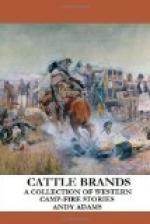II
SEIGERMAN’S PER CENT
Towards the wind-up of the Cherokee Strip Cattle Association it became hard to ride a chuck-line in winter. Some of the cattle companies on the range, whose headquarters were far removed from the scene of active operations, saw fit to give orders that the common custom of feeding all comers and letting them wear their own welcome out must be stopped. This was hard on those that kept open house the year round. There was always a surplus of men on the range in the winter. Sometimes there might be ten men at a camp, and only two on the pay-roll. These extra men were called “chuck-line riders.” Probably eight months in the year they all had employment. At many camps they were welcome, as they would turn to and help do anything that was wanted done.
After a hard freeze it would be necessary to cut the ice, so that the cattle could water. A reasonable number of guests were no drawback at a time like this, as the chuck-line men would be the most active in opening the ice with axes. The cattle belonging to those who kept open house never got so far away that some one didn’t recognize the brand and turn them back towards their own pasture. It was possible to cast bread upon the waters, even on the range.
The new order of things was received with many protests. Late in the fall three worthies of the range formed a combine, and laid careful plans of action, in case they should get let out of a winter’s job. “I’ve been on the range a good while,” said Baugh, the leader of this trio, “but hereafter I’ll not ride my horses down, turning back the brand of any hidebound cattle company.”
“That won’t save you from getting hit with a cheque for your time when the snow begins to drift,” commented Stubb.
“When we make our grand tour of the State this winter,” remarked Arab Ab, “we’ll get that cheque of Baugh’s cashed, together with our own. One thing sure, we won’t fret about it; still we might think that riding a chuck-line would beat footing it in a granger country, broke.”
“Oh, we won’t go broke,” said Baugh, who was the leader in the idea that they would go to Kansas for the winter, and come back in the spring when men are wanted.
So when the beef season had ended, the calves had all been branded up and everything made snug for the winter, the foreman said to the boys at breakfast one morning, “Well, lads, I’ve kept you on the pay-roll as long as there has been anything to do, but this morning I’ll have to give you your time. These recent orders of mine are sweeping, for they cut me down to one man, and we are to do our own cooking. I’m sorry that any of you that care to can’t spend the winter with us. It’s there that my orders are very distasteful to me, for I know what it is to ride a chuck-line myself. You all know that it’s no waste of affection by this company that keeps even two of us on the pay-roll.”




